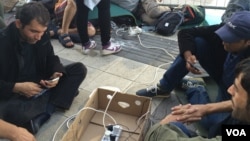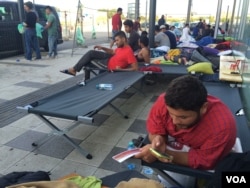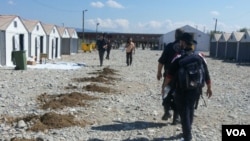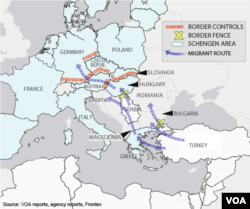When the train to Germany arrived in Vienna there was an air of panic.
“Go, go, go!” coached 20-year-old Monhaf, rushing down the narrow train aisle.
“But where?” Only Mohammad knew our cabin numbers, and all the seats were full.
Everyone boarding the train had purchased a ticket - roughly $200. Even so, the journey that brought them to Europe from war zones in the Middle East had left so many behind; no one would risk missing the train.
Refugees fleeing Syria for Europe are increasingly young and able men, rather than the country’s most vulnerable impoverished families that have been running for more than four years. And these five friends boarding the train, as far has I have observed, represent a surge of pride among Syrian youth who don’t see themselves as victims, but as adventurers who simply refuse to play the hand they were dealt.
Looking toward future
The men had fled Syria, some fearing arrest, forced conscription or their homes being bombed. All faced a bleak future in a country ravaged by a war they didn’t create. More than one young man on the journey cried when talking about or to the mothers they all have praying for them in Syria.
“I can’t explain it. It’s too big,” said 22-year-old Maged, when asked how he felt about finally getting on a train to Germany. When the passengers found their seats, Monaf burst into song and the rest quickly joined in.
“Germany, Germany, what’s wonderful is Germany,” they sang, dancing in their seats. “If we can’t go from Turkey, we will go from Spain."
In Arabic, the song rhymes and the men said they learned it a few months ago.
Safely on the train, the conversation immediately turned to the major question for some: where to next? When a refugee officially registers in a country, he or she more or less gives up the right to change his or her mind.
“It’s my dream. It’s real now,” said 20-year-old Omar, who insists he has wanted to be a dentist since childhood, despite his friends’ teasing. His anguish, however, was visible. When he reached Germany, he would have to decide in a matter of hours, not days, if he would stay there or register as a refugee in another country.
After we changed trains in Hanover, Omar and I passed the time trying to tally the militant groups and armies fighting in Syria. We counted nine. For these men, there is no going back.
Later in the day, after their first taste of Arab food in Germany, another man wept as he described his mother running after his bus, crying out, as he rode out of Damascus less than two weeks before. He sharply rebuffed his friends’ sympathies.
“Stop,” he said, as Omar tried to comfort him. Fear and sorrow are generally rejected here.
“Our luck is very, very good,” he added.
It took the friends a little over a week - a relatively short time - to get from Syria to Germany and selfies were snapped at every stop, often with hands up in “V” for victory. The first were sent at 4:00 a.m. one night last week, after they traveled by rubber boat from Turkey to Greece, a journey by sea that has ended countless lives.
The only part of the trip where no pictures were sent to worried family and friends was Hungary, the country along this route that refugees fear the most.
“No, no,” said Omar, shaking his finger, when I asked if they neglected to send pictures because they were scared. Hungary had offered a one-day special the day before they closed the borders. Refugees passed swiftly across the country in packed government-provided trains.
“Our luck is very, very good,” Omar later said at a coffee shop in Germany. “Very, very good.
Those left behind
Not everyone I met along the way had any luck at all. At every stop, from the Syrian border with Turkey to Germany, we saw refugees left behind.
Families slept in parks in Turkey, after spending all their money to smuggle themselves out of Syria. They had none left to pay for the rubber boat to Greece. We left impoverished children and elderly people camping out in tents by the docks in Greece, hoping to get on a boat to Athens.
We didn’t see the camps in Hungary, but months ago, among Syrian refugees, a “camp” was a place of moderate respite. Now a “camp” is considered just another kind of prison. At the train station in Athens, aid workers quickly learned to avoid the word when refugees refused to exit the station at closing time.
Beyond the people left behind at home were now friends and families trapped behind the Hungarian border. Thousands spent their life savings to get that far, and many don’t know what to do next.
“The border is closed,” texted Thiaa, a refugee traveling not far behind us. He responded to our concern with only: “What about the border?”
Bittersweet arrival
For the friends in Germany, the language of illegal immigration: smugglers, borders, small boats and tides is being replaced by the language of refugees. Now they are talking about legal status, rights and responsibilities and the weight of their choices ahead.
The place in which they are fingerprinted will likely be their homes for the foreseeable future. Omar is torn, not knowing where he will find the best universities. Other men are confused, with loved ones already settled in more than one place.
Even for the men determined to stay in Germany, the decision to register as a refugee means they can’t go home. Ahmed, 24, from an old Syrian tourist town, dreams of being a football player, spending his spare time swimming in the sea.
“I felt weird swimming in another country,” he said in Greece after he took a dive, having survived the dangerous overnight journey. “It felt like I will never go back to my country.”














